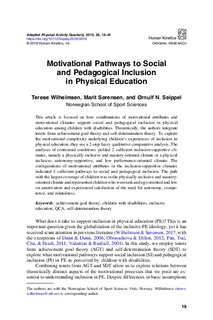| dc.contributor.author | Wilhelmsen, Terese | |
| dc.contributor.author | Sørensen, Marit | |
| dc.contributor.author | Seippel, Ørnulf | |
| dc.date.accessioned | 2019-04-29T10:49:50Z | |
| dc.date.available | 2019-04-29T10:49:50Z | |
| dc.date.created | 2019-03-05T12:57:36Z | |
| dc.date.issued | 2019 | |
| dc.identifier.citation | Adapted Physical Activity Quarterly. 2019, 36, 19-41. | nb_NO |
| dc.identifier.issn | 0736-5829 | |
| dc.identifier.uri | http://hdl.handle.net/11250/2595920 | |
| dc.description | This is an open access article. | nb_NO |
| dc.description.abstract | This article is focused on how combinations of motivational attributes and motivational climates support social and pedagogical inclusion in physical education among children with disabilities. Theoretically, the authors integrate tenets from achievement-goal theory and self-determination theory. To capture the motivational complexity underlying children’s experiences of inclusion in physical education, they use a 2-step fuzzy qualitative comparative analysis. The analyses of contextual conditions yielded 2 sufficient inclusion-supportive climates, namely a physically inclusive and mastery-oriented climate or a physical inclusive, autonomy-supportive, and low performance-oriented climate. The configurations of motivational attributes in the inclusion-supportive climates indicated 4 sufficient pathways to social and pedagogical inclusion. The path with the largest coverage of children was in the physically inclusive and mastery-oriented climate and represented children who were task and ego oriented and low on amotivation and experienced satisfaction of the need for autonomy, competence, and relatedness. | nb_NO |
| dc.language.iso | eng | nb_NO |
| dc.subject | achievement-goal theory | nb_NO |
| dc.subject | children with disabilities | nb_NO |
| dc.subject | inclusive education | nb_NO |
| dc.subject | QCA | nb_NO |
| dc.subject | self-determination theory | nb_NO |
| dc.title | Motivational Pathways to Social and Pedagogical Inclusion in Physical Education | nb_NO |
| dc.type | Journal article | nb_NO |
| dc.type | Peer reviewed | nb_NO |
| dc.description.version | publishedVersion | nb_NO |
| dc.rights.holder | © 2019 Human Kinetics, Inc. | nb_NO |
| dc.source.pagenumber | 19-41 | nb_NO |
| dc.source.volume | 36 | nb_NO |
| dc.source.journal | Adapted Physical Activity Quarterly | nb_NO |
| dc.source.issue | 1 | nb_NO |
| dc.identifier.doi | 10.1123/apaq.2018-0019 | |
| dc.identifier.cristin | 1682369 | |
| dc.description.localcode | Seksjon for coaching og psykologi / Department of Coaching and Psychology | nb_NO |
| cristin.unitcode | 150,32,0,0 | |
| cristin.unitcode | 150,33,0,0 | |
| cristin.unitname | Seksjon for coaching og psykologi | |
| cristin.unitname | Seksjon for kultur og samfunn | |
| cristin.ispublished | true | |
| cristin.fulltext | original | |
| cristin.qualitycode | 1 | |
